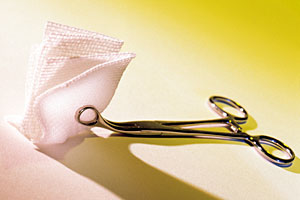Absorbable Surgical Hemostat
Feedsee Medical : Absorbable Surgical Hemostat : Plant-based, flowable powder for cardiac, orthopedic, spinal, and general surgical applications
 In 2006, Medafor's Arista AH Absorbable Hemostat received FDA approval. In the U.S., this easy-to-use, efficacious and safe hemostat was indicated for most types of surgery including cardiac, orthopedic, spinal and general surgical applications. The surgical hemostat consists of Medafor's patented Microporous Polysaccharide Hemospheres, a plant-based, flowable powder engineered to rapidly dehydrate blood, enhancing clotting on contact. Arista AH facilitated the formation of a highly resilient, natural clot within just a few minutes regardless of the patient's coagulation status. The hemostat was instantly ready to use, requiring no mixing, no addition of patient blood or other components and no special handling or storage conditions.
In 2006, Medafor's Arista AH Absorbable Hemostat received FDA approval. In the U.S., this easy-to-use, efficacious and safe hemostat was indicated for most types of surgery including cardiac, orthopedic, spinal and general surgical applications. The surgical hemostat consists of Medafor's patented Microporous Polysaccharide Hemospheres, a plant-based, flowable powder engineered to rapidly dehydrate blood, enhancing clotting on contact. Arista AH facilitated the formation of a highly resilient, natural clot within just a few minutes regardless of the patient's coagulation status. The hemostat was instantly ready to use, requiring no mixing, no addition of patient blood or other components and no special handling or storage conditions.
What are Hemostats?
Hemostats, also known as hemostatic clamps, are surgical tools used in many types of surgical procedures to control bleeding. The term can refer both to a physical clamp that mechanically closes a bleeding vessel, and to various chemical agents that encourage clotting.
- Mechanical Hemostats: These are often likened to very precise pliers or tweezers. They are used to clamp off blood vessels that are bleeding and are typically made of high-grade stainless steel. Some hemostats have a locking mechanism that allows them to clasp and hold tissue or vessels securely. Surgeons can use these clamps to securely close off a vessel while they suture or tie off the bleed.
- Hemostatic Agents: These can be in the form of gels, powders, foams, patches, or other formats, and are used to chemically promote rapid clotting at the site of a bleed. They can be made from various materials, including collagen, gelatin, cellulose, or even synthetic substances. Hemostatic agents are used in surgeries where the control of bleeding by traditional surgical techniques is ineffective or impractical.
These hemostatic tools are vital in surgery as they allow surgeons to maintain control of the surgical field, keep it clear of blood, and minimize blood loss, which can be critical for patient outcomes.